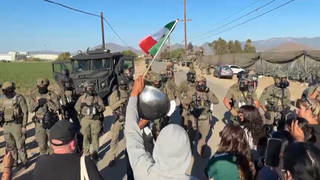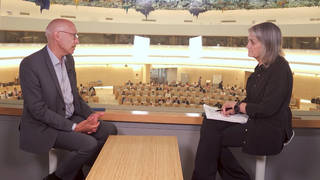Democracy Now! Thursday, July 17, 2025
This content originally appeared on Democracy Now! Audio and was authored by Democracy Now!.
This post was originally published on Radio Free.
Democracy Now! Thursday, July 17, 2025
This content originally appeared on Democracy Now! Audio and was authored by Democracy Now!.
This post was originally published on Radio Free.
This content originally appeared on Democracy Now! and was authored by Democracy Now!.
This post was originally published on Radio Free.
This content originally appeared on Democracy Now! and was authored by Democracy Now!.
This post was originally published on Radio Free.
This content originally appeared on Democracy Now! and was authored by Democracy Now!.
This post was originally published on Radio Free.
This content originally appeared on Democracy Now! and was authored by Democracy Now!.
This post was originally published on Radio Free.
This content originally appeared on Democracy Now! and was authored by Democracy Now!.
This post was originally published on Radio Free.
This content originally appeared on Democracy Now! and was authored by Democracy Now!.
This post was originally published on Radio Free.
This content originally appeared on Democracy Now! and was authored by Democracy Now!.
This post was originally published on Radio Free.
This content originally appeared on Democracy Now! and was authored by Democracy Now!.
This post was originally published on Radio Free.
This content originally appeared on Democracy Now! and was authored by Democracy Now!.
This post was originally published on Radio Free.

An immigration raid in Camarillo, California, on Thursday led to an hourslong standoff between protesters and federal border agents, who blocked the roads with military-style vehicles and tear-gassed community members, including children, as crowds attempted to protect dozens of farmworkers from arrest.
The Department of Homeland Security said over 300 immigrants were detained in dual raids on cannabis farms and agricultural fields in Camarillo and the coastal city of Carpinteria. One farmworker fell from the roof of a greenhouse during the immigration raid and later died of his injuries. Jaime Alanís, 57, had worked at the farm in Camarillo for 10 years and provided for his wife and daughter who live in Mexico. Alanís is the first known person to die during an immigration raid since President Trump returned to office.
“It was almost unlike anything that we had ever seen before,” says Angelmarie Taylor, a
student and volunteer with 805 Immigrant Coalition who was present during the raid in Camarillo.
“We’re talking about human beings. We’re talking about parents, just like the gentleman that passed because of the chaotic actions of ICE,” says Luis McArthur, mayor of nearby Oxnard.
This content originally appeared on Democracy Now! and was authored by Democracy Now!.
This post was originally published on Radio Free.

Israeli Prime Minister Benjamin Netanyahu has repeatedly rejected ceasefire deals and other chances to deescalate the devastating war in Gaza and beyond, all to remain in power and avoid corruption charges, according to a new investigation in The New York Times Magazine. “Netanyahu put the integrity of the coalition, the safety of his continuous rule of the government and the state … as a first priority ahead of any other priority,” says Ronen Bergman, Pulitzer Prize-winning Israeli investigative reporter.
This content originally appeared on Democracy Now! and was authored by Democracy Now!.
This post was originally published on Radio Free.

The official death toll in Gaza has topped 58,000, with Israeli forces continuing to shoot at Palestinians seeking aid and talks over a ceasefire agreement stalled in Doha. This morning’s injured were taken to Nasser Hospital, the largest functioning hospital in Gaza, facing fuel shortages and a widening Israeli offensive in the area. Democracy Now! spoke with Dr. Tarek Loubani, an emergency room medical doctor who has been volunteering in Nasser Hospital in Gaza since June, live from Gaza.
“Every day seems to be a new exercise in the depths of human depravity in terms of targeting men, boys, women and children, especially in terms of the youngest children,” says Loubani. “I think every doctor who operates and works in Palestine will tell you that that’s the most jarring, the most terrible part of our job, is just the war on children on every level.”
This content originally appeared on Democracy Now! and was authored by Democracy Now!.
This post was originally published on Radio Free.
This content originally appeared on Democracy Now! Audio and was authored by Democracy Now!.
This post was originally published on Radio Free.
This content originally appeared on Democracy Now! and was authored by Democracy Now!.
This post was originally published on Radio Free.
This content originally appeared on Democracy Now! for Broadcasters – HD MP4 and was authored by Democracy Now! for Broadcasters – HD MP4.
This post was originally published on Radio Free.
This content originally appeared on Democracy Now! and was authored by Democracy Now!.
This post was originally published on Radio Free.
This content originally appeared on Democracy Now! and was authored by Democracy Now!.
This post was originally published on Radio Free.
This content originally appeared on Democracy Now! and was authored by Democracy Now!.
This post was originally published on Radio Free.
This content originally appeared on Democracy Now! and was authored by Democracy Now!.
This post was originally published on Radio Free.

Democracy Now! recently interviewed U.N. High Commissioner for Human Rights Volker Türk in Geneva, Switzerland. The wide-ranging conversation touched on immigration policy in the United States, climate change around the world, the global fight to preserve human rights and more.
See Part 1 of our conversation with Türk, including his response to Israel’s brutal war on Gaza.
This content originally appeared on Democracy Now! and was authored by Democracy Now!.
This post was originally published on Radio Free.

Rescue teams in central Texas are still searching for about 160 people who went missing in the catastrophic flash floods on July 4. The official death toll has climbed to at least 121 victims. State policymakers are now in the spotlight, as questions swirl around Texas’s lack of emergency precautions and the climate denialism of Republican political leaders. “Many of those lost lives could have been saved if links in our disaster response chain hadn’t been broken,” says Monica Medina, a former official at National Oceanic and Atmospheric Administration, the federal administration that, among other tasks, monitors extreme weather. NOAA has been hit by major cuts to funding and staffing under Trump, despite the increasing frequency and intensity of natural disasters from climate change. Medina is among many climate and policy experts sounding the alarm on the defunding of NOAA and other meteorological and disaster preparedness services. “We are firing the people. We’re stopping taking in the data. We’re ending the research. We’re turning off the satellites. We’re doing everything we possibly can to put our heads in the sand in the midst of what is increasingly dangerous weather.”
This content originally appeared on Democracy Now! and was authored by Democracy Now!.
This post was originally published on Radio Free.
This content originally appeared on Democracy Now! Audio and was authored by Democracy Now!.
This post was originally published on Radio Free.
Democracy Now! Friday, July 11, 2025
This content originally appeared on Democracy Now! Audio and was authored by Democracy Now!.
This post was originally published on Radio Free.
This content originally appeared on Democracy Now! and was authored by Democracy Now!.
This post was originally published on Radio Free.
This content originally appeared on Democracy Now! Audio and was authored by Democracy Now!.
This post was originally published on Radio Free.